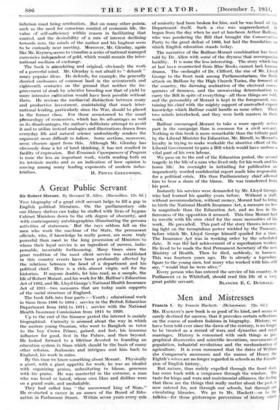A Great Public Servant .
Sir Robert Morant. By Bernard M. Allen. (Macmillan. 12s. 6d.)
Tins biography of a great civil servant-helps to fill a gap in English political literature. On the parliamentary side our library shelves can today be stuffed with lives of bygme Cabinet Ministers down to the nth degree of obscurity, and with contemporary autobiographies illuminating the persona activities of statesmen:- Slit the rays seldom fall on the men who work the machine of the State, the permanent officials, who, if knowledge be really power, are more . truly powerful than • most . in the long procesSion- of Ministers-1to whom their loyal service is an ingredient of success, indis- pensable, invariably forthcoming. Many -times -since the great tradition of the most silent service was established in this country events have been profoundly affected by the relations between the head of a department and his political chief. Here is a rich, almost virgin-, soil for the historian. If anyone doubtS, let him read/ as a sample, the life of Robert Morant, and his work for Mr. Balfour's Education Act of 1902, and Mr. Lloyd George's National Health Insurance Act of 1911—two measures that are today main supports
of the social structure of England. . .
The book falls into four parts :—Youth ; edueational work in Siam from 1886 to 1894 ; service in the British Education Department from 1895 to 1911; service with the National Health Insurance Cominission from 1911 to 1920.
Up to the end of the Siamese period the interest is mainly biographical. Curiosity is aroused about the. way in which the austere young Oxonian, who went to Binigkok as tutor to the boy Crown Prince, gained, and lost, his immense influence for good, first in the Palace, and then beyond. He looked forward to a lifetime devoted to founding an education system in Siam which should be the basis of many other reforms. Jealousies and intrigues sent him back to England, his work in. ruins.
By this time we know something about Morant. Physically a giant, with a giant appetite for work, he was an idealist with organizing genius, unhesitating to - blame, generous with his praise. He was masterful in the extreme, a man who was loved or hated, whose own likes and dislikes were on a grand scale, and unshakable.
They had called him " the uncrowned king of Siam." He re-started a career in an annex of the Board of Edu- cation in Parliament Street. -Within seven years every rule of seniority had been broken for him, and he was head of the DepartmeaC itself. Such a_ rise was unprecedented. It began from the day when he met at luncheon Arthur Balfour, who was pondering the Bill that brought the Conservative Party to the great defeat of 1906, but laid the foundation on which English education stands today.
The narrative of the Balfour-Morant combination has been told by Dr. Allen with some of the dryness that accompanies lucidity. It is none the less interesting.. The story which has at last been resurrected from Blue Books cannot lack human drama. The onslaught of Dr. Clifford, the rise of Mr. Lloyd George to the front rank among Parliamentarians, the -flank attack on Balfour by the High Church _Tories, the ferment of the country, the dawning. realization of -the electoral conse- qtienees of firmness, and the unwavering determination to carry the Bill in- spite of everything—all these things are told, and the personality of Morant is kept in the foreground, sus- taining his chief with the mighty support of unrivalled expert knowledge which Balfour could handle as none other. Their two minds interlocked, and they were both masters in their work.
Balfour encouraged Morant. to take a. more openly active part in the campaign than is common for a civil servant. Nothing in this book is more remarkable than the tribute paid 1 by the Liberal Minister 'for Edueaticin,11fr. Birrell, to Morants loyalty in trying to make workable the abortive effort of the Liberal Government to pais a Bill which would have undone a vital part of his own labour. ' ' -
We pass on to the end of the Education period, the second tragedy in the life ofa man who limed only fdr his work and his home life' An oversight in initialling for publication an imprudently worded confidential report made him responsible for a political crisis. His then Parliamentary chief allowed him to bear a share of the blame. He was transferred from his post.
Instantly his services were demanded by Mr. Lloyd George, who had learned his quality years before: Without a staff, without accommodation, without money, Morant had to bring to birth the National Health Insurance Act, a measure no less in magnitude than the Education Act, and no less in the fierceness of the opposition it aroused. This time Morant had to wrestle with own chief for the mere-necessities of his work. He prevaile4: This part of the story throws interest- ing light oh the tremOridous poiver wielded by the Treasury, before -Whieh Mr. Lloyd George himself quailed for a time. The Insurance Act' rias in working order by the scheduled
date. • It was the telt achievement of a superhuman worker. He lived to be made the first Permanent Secretary of the new Ministry of Health. Then he died, suddenly, in harness. This was fourteen years ago. He is already a legendary figure to the young men, but many who worked with him still say, would that he were alive."
Every person who has entered the service of his country, in Parliament cr. in Whitehall, should read this life of a very


















































 Previous page
Previous page